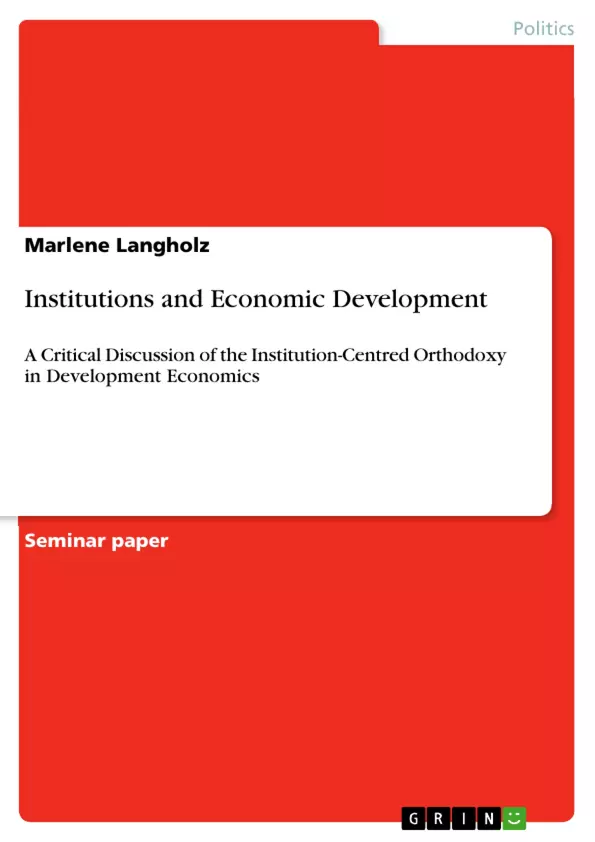The main goal of Development Economics is to find the reasons for the rather big differences in levels of income throughout the world. Why, for instance, did European nations after the eighteenth century develop faster than Asian, African or Latin American nations and what can be done to reduce the so caused differences in income and growth?1 In recent years, many economists used institutions to explain why structural adjustment programs in poor countries have failed so far. Not the programs itself, so the tenor, but the lack of “good institutions” has been blamed for the failure of many developing countries to catch up. In this paper, the current institution centered orthodoxy in development economics will be discussed from a critical point of view. In the first part, different strands of development theory will be reviewed. Secondly, the reasons for the prominence of New Institutional Economics will be analyzed. Finally, it will be discussed, if the institutional approach is holding its promises and if it is useful to focus on the institutional variable to explain economical development.
Inhaltsverzeichnis (Table of Contents)
- Introduction
- The Institutional Turn
- Different approaches of explaining growth through institutions
- Colonial Heritage
- Colonial Heritage Plus
- Political Conflict
- Beliefs and Norms
- International Trade
- Discussion of the institution centred orthodoxy in development economics
- What is a good property rights system?
- How persistent are institutions really?
- Is institutional imitation the road to success?
- Conclusion
Zielsetzung und Themenschwerpunkte (Objectives and Key Themes)
This paper critically examines the institution-centered orthodoxy in development economics. It aims to explore why structural adjustment programs in developing countries have been largely ineffective, with a focus on the role of institutions in promoting economic development.
- The relationship between institutions and economic growth.
- The impact of colonial heritage on institutional development.
- The role of factor endowments and disease in shaping institutions.
- The effectiveness of institutional imitation in promoting economic success.
- The challenges and limitations of the institution-centered approach in development economics.
Zusammenfassung der Kapitel (Chapter Summaries)
- Introduction: This chapter outlines the central research question: why do income levels differ significantly across the world? It introduces the concept of institutions as a key explanatory factor and highlights the critical perspective adopted in this paper.
- The Institutional Turn: This chapter examines the growing emphasis on institutions as crucial elements of efficient economies. It discusses how the focus on institutions emerged in response to the failures of orthodox market liberalization policies. The chapter also explores the various roles institutions play in shaping economic behavior and promoting economic development.
- Different approaches of explaining growth through institutions: This chapter delves into different theoretical perspectives within New Institutional Economics. It presents a categorization of these perspectives, including Colonial Heritage, Colonial Heritage Plus, Political Conflict, Beliefs and Norms, and International Trade. This section explores how each perspective seeks to explain the impact of institutions on economic growth.
- Colonial Heritage: This chapter analyzes the theory that colonial institutions have hindered economic development in certain regions. It examines the argument that colonial powers imposed inefficient institutional systems on their colonies, leading to slower industrialization and less competitive markets.
- Colonial Heritage Plus: This chapter expands on the colonial heritage perspective by considering additional factors that influenced institutional development. It explores how the conditions in colonized territories, including labor scarcity, influenced the types of institutions established. It also examines the role of factor endowments in shaping institutions, such as the impact of plantation agriculture on power structures and wealth distribution.
Schlüsselwörter (Keywords)
The key terms and focus topics of this paper include institutional economics, development economics, economic growth, institutions, colonialism, property rights, factor endowments, disease, institutional imitation, and economic development. The work explores the relationship between institutions and economic development, examining different theoretical perspectives and their implications for understanding and addressing disparities in global income levels.
Frequently Asked Questions
Why do income levels differ so much globally?
Development economics suggests that the presence or lack of "good institutions" is a primary reason why some nations grow faster than others.
What is New Institutional Economics?
It is a strand of theory that focuses on the role of social and legal norms, property rights, and political structures in shaping economic development.
How did colonialism impact institutional development?
Colonial powers often imposed institutional systems that favored extraction over development, which can still hinder economic progress in former colonies today.
What are property rights in economic development?
Secure property rights are considered a "good institution" because they encourage investment and protect assets, leading to long-term growth.
Is institutional imitation effective for poor countries?
The paper discusses whether simply copying Western institutions is a viable road to success or if local context and history are more important.
What role do factor endowments play?
Factors like labor scarcity, climate, and natural resources influence the types of institutions a society develops, such as plantation-based or industrial systems.
- Quote paper
- Marlene Langholz (Author), 2008, Institutions and Economic Development, Munich, GRIN Verlag, https://www.grin.com/document/154413



